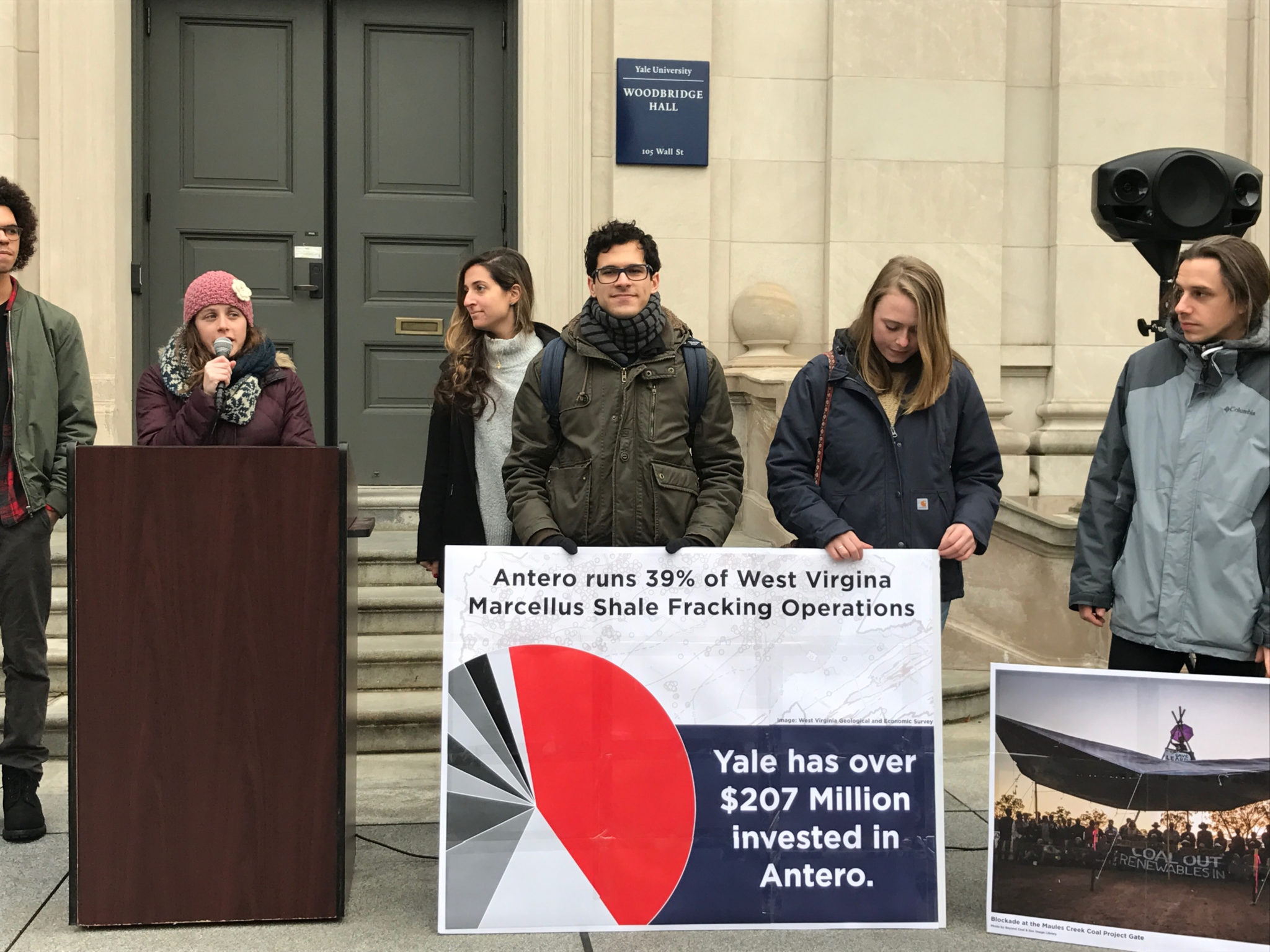
Forty members of Fossil Free Yale and graduate student union Local 33 demanded that Yale disclose its fossil fuel investments and divest from fossil fuel at a protest outside Woodbridge Hall Friday afternoon.
Representatives from the two groups delivered signatures from more than 1,000 Yale community members to University President Peter Salovey’s office. In addition to demanding that the University disclose investments and divest from fossil fuels, FFY and Local 33 called on Yale to make environmentally sustainable investments and sign the “We are Still In” declaration. Signatories of the declaration commit to the goals outlined in the Paris Agreement and denounce President Donald Trump’s decision to withdraw the United States from the accord.
“As the fossil fuel companies profit, the Yale Corporation profits,” said Fossil Free Yale Member Zach Montas ‘21. “Sidestepping meaningful action because the second largest university endowment in the United States might not grow as quickly is wrong.”
In 2016, Chief Investment Officer David Swensen announced that Yale had divested from investments in oil-sands production and coal worth around $10 million since 2014. But Fossil Free Yale alleges that, given publicly known investments, the University still has $678 million in fossil fuel companies. As a policy, Yale does not comment on specific investments.
Local 33’s partnership with Fossil Free Yale is one of the union’s latest effort to join forces with undergraduate groups on campus. This fall, Local 33 began a campaign with Students Unite Now –– an undergraduate group with strong ties to the union umbrella organization UNITE HERE –– jointly advocating for the elimination of the student income contribution and for Yale to begin negotiations with Local 33.
According to union co-chair Robin Canavan GRD ‘19, Local 33’s coordinating committee voted to endorse the petition in conjunction with Fossil Free Yale.
But Canavan, a PhD candidate in the geology and geophysics department, also has a personal stake in the matter. Her research focuses on the planet’s climate and temperature at carbon dioxide levels in the Cretaceous period.
“One of the key things we’re asking in this petition is to have a conversation, ” she said. “What’s really important is to have a transparent conversation about what the endowment is actually invested in with the whole Yale community.”
Leehi Yona FES ’18 called for Yale to join other educational institutions — including Columbia University and Dartmouth College — across the country to sign the We Are Still In declaration in support of climate action. The movement has garnered support from over 2,500 politicians, businesses and other leaders after President Donald Trump declared U.S.’s withdrawal from the Paris climate accord.
“Despite touting that it is taking action on climate change, [Yale] is not even doing the very bare minimum that our peer institutions are doing,” Yona said. “By investing in these companies Yale is betting on and hoping to profit from climate change in action, which goes against all the lip service that President Salovey has put out.”
Although Yona praised Yale’s carbon charge project, a first-of-its-kind internal carbon pricing scheme that the University has implemented since September, she said a sole focus on “small, relatively insignificant individual action” does not help address climate change, which is a systemic issue.
In June, Salovey and 11 other university presidents formed a new coalition pledging to meet the United States’ obligations under the Paris climate accord. But Yale opted not to join the coalition of companies, cities, states and universities that formally pledged to fulfill the Paris Agreement as part of a group mobilized by former New York City Mayor Michael Bloomberg and environmental nonprofit Second Nature.
At the time, Vice President for Communications Eileen O’Connor told the News that Yale chose to form its own coalition because officials did not have enough information about what joining the Bloomberg group would entail.
In fiscal year 2017, Yale generated 11.3 percent returns on its endowment investments.
Hailey Fuchs | hailey.fuchs@yale.edu







